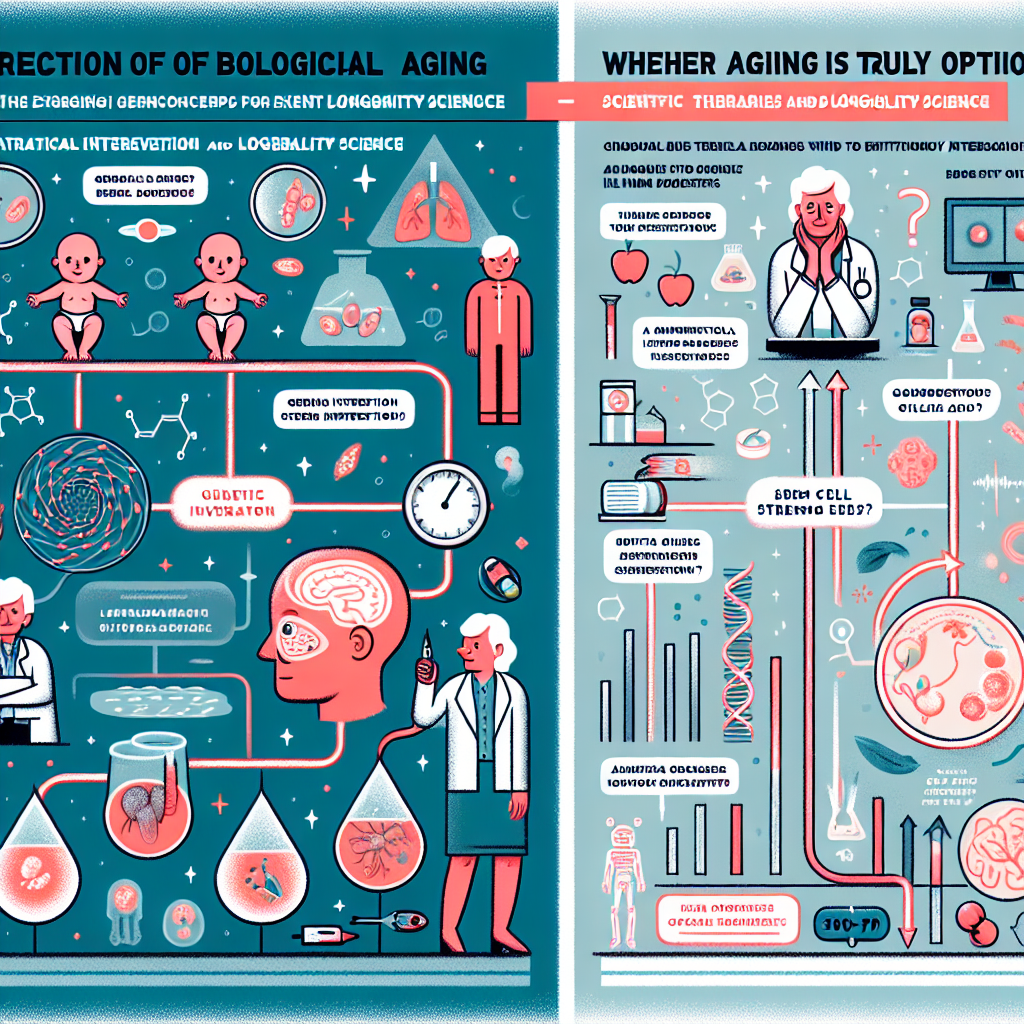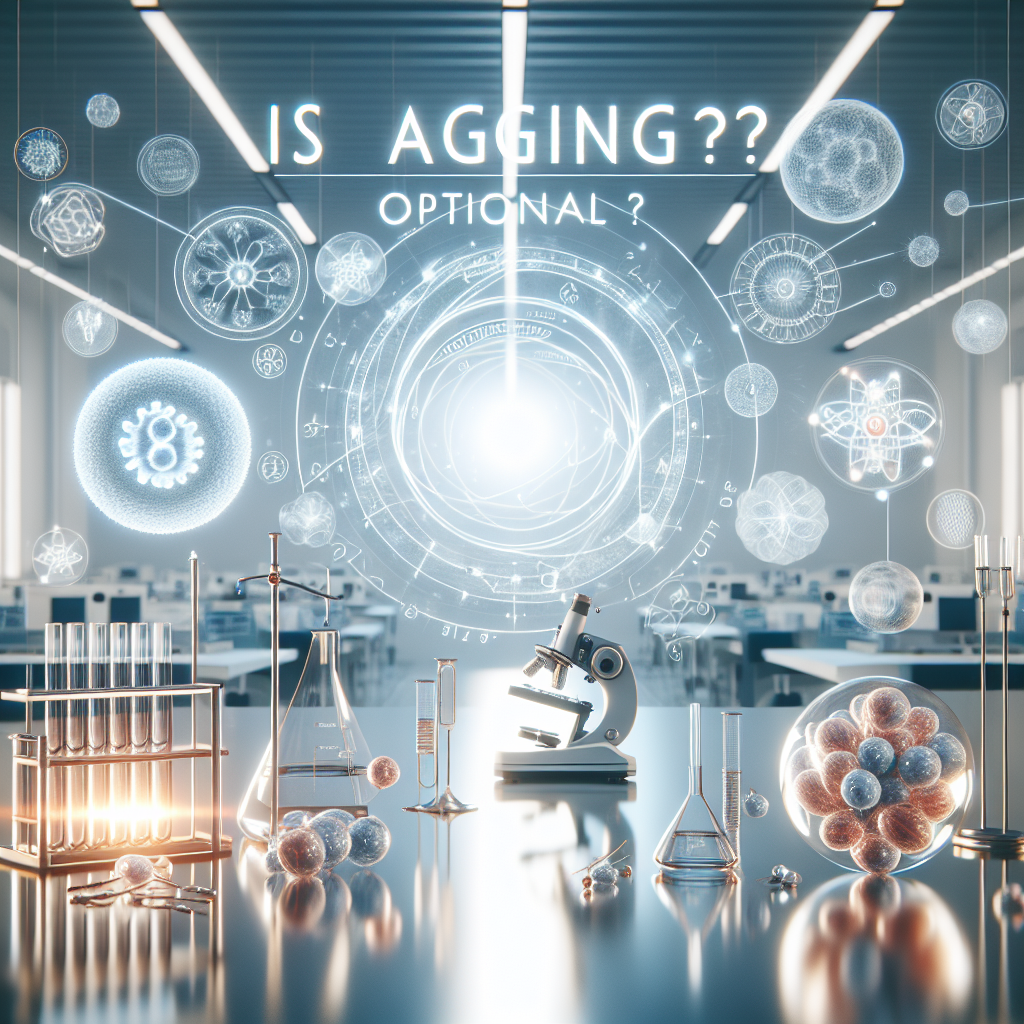Is Aging Optional? Exploring the Limits of Longevity Science

Discover if aging is truly optional and explore the fascinating limits of longevity science. Uncover the secrets to a longer, healthier life. Visit www.myvibrantvitality.com now.
Unveiling the Secrets of Longevity: Is Aging Truly Optional?
The quest for eternal youth is as old as human civilization itself. From the mythical Fountain of Youth to modern scientific research, humanity has always been fascinated by the prospect of halting or even reversing the aging process. But is aging truly optional? This question lies at the heart of longevity science, a field that explores the biological mechanisms of aging and seeks ways to extend healthy human lifespan.
The human body is a complex system of cells, tissues, and organs, all of which age over time. Aging is a natural process, characterized by a gradual decline in physiological functions and an increased risk of diseases such as cancer, heart disease, and Alzheimer’s. However, recent advances in biotechnology and genetics have begun to challenge our traditional understanding of aging.
Scientists have discovered that aging is not just a passive process of wear and tear, but an active biological phenomenon regulated by specific genes and biochemical pathways. This groundbreaking revelation has led to the development of various anti-aging interventions, from dietary changes and physical exercise to more radical approaches like gene therapy and stem cell transplantation.
One of the most promising areas of longevity science is the study of telomeres, the protective caps at the ends of our chromosomes. Telomeres shorten each time a cell divides, and when they become too short, the cell can no longer divide and becomes senescent or dies. This process is believed to be one of the primary drivers of aging. However, an enzyme called telomerase can rebuild these telomeres, potentially extending the lifespan of cells and, by extension, the organism itself.
Another exciting development in longevity science is the discovery of senolytics, drugs that selectively kill senescent cells. Senescent cells are old cells that have lost their ability to divide but still remain in the body, secreting harmful substances that can damage surrounding tissues and contribute to aging. By eliminating these cells, senolytics could potentially slow down the aging process and extend healthy lifespan.
Despite these promising advances, it’s important to note that longevity science is still in its early stages. While we have made significant strides in understanding the biological mechanisms of aging, translating these findings into effective anti-aging interventions is a complex and challenging task. Moreover, the ethical implications of life extension are a subject of ongoing debate.
For instance, if we could significantly extend human lifespan, how would this impact our society and our planet? Would it lead to overpopulation and resource scarcity, or would it usher in a new era of wisdom and experience, where individuals have more time to contribute to society? These are questions that we must carefully consider as we continue to explore the limits of longevity science.
In conclusion, while aging may not be entirely optional at this point, the field of longevity science is making remarkable progress in understanding and potentially manipulating the aging process. The dream of extending healthy human lifespan may not be as far-fetched as it once seemed. However, it’s crucial that we approach this endeavor with caution, balancing our desire for longevity with the ethical, social, and environmental implications of life extension.
The Future of Longevity Science: Debunking the Myth of Optional Aging

Is aging optional? This question has been the subject of intense debate in the scientific community for years. The field of longevity science, which focuses on understanding the biological processes that govern aging and lifespan, has made significant strides in recent years. However, the notion of optional aging, or the idea that we can choose not to age, remains a contentious issue.
The concept of optional aging is rooted in the belief that aging is not an inevitable biological process, but rather a disease that can be treated or even cured. This perspective has been fueled by advancements in longevity science, which have revealed that aging is influenced by a complex interplay of genetic, environmental, and lifestyle factors. For instance, studies have shown that caloric restriction, regular exercise, and certain drugs can slow down the aging process and extend lifespan in various organisms.
However, the idea of optional aging is a gross oversimplification of the complexities of the aging process. While it is true that we can influence our rate of aging to some extent, it is not within our power to stop or reverse it entirely. Aging is a natural and universal process that is deeply ingrained in our biology. It is governed by a multitude of interconnected biological systems and processes, many of which are still not fully understood.
Moreover, the notion of optional aging is based on the assumption that longevity is the ultimate goal of life. This perspective overlooks the fact that aging is not just about living longer, but also about maintaining health and quality of life in old age. Longevity science is not just about extending lifespan, but also about promoting ‘healthspan’ – the period of life spent in good health.
The future of longevity science lies not in the pursuit of immortality, but in the quest to understand the biology of aging and to develop interventions that can enhance healthspan. This involves not only slowing down the aging process, but also preventing or delaying the onset of age-related diseases, such as Alzheimer’s, heart disease, and cancer.
In recent years, researchers have made significant progress in this regard. For instance, they have identified several ‘longevity genes’ that are associated with extended lifespan and healthspan in various organisms. They have also developed drugs that can mimic the effects of caloric restriction, one of the most potent life-extending interventions known to science.
However, these advances should not be misconstrued as evidence that aging is optional. They merely show that it is possible to influence the aging process and to extend healthspan. The goal is not to achieve immortality, but to enable people to live longer, healthier lives.
In conclusion, the notion of optional aging is a myth. While longevity science has made significant strides in understanding the biology of aging and in developing interventions to extend healthspan, it is not within our power to stop or reverse the aging process entirely. The future of longevity science lies in the quest to enhance healthspan, not in the pursuit of immortality. Aging is a natural and universal process, and while we can influence it to some extent, it is not optional.
Exploring the Boundaries of Life Extension: Can We Really Choose Not to Age?
Is aging optional? This question, once the stuff of science fiction, is now a topic of serious scientific inquiry. As researchers delve into the mysteries of the human body and the nature of aging, they are beginning to explore the boundaries of life extension. Can we really choose not to age? The answer is complex and multifaceted, but recent advancements in longevity science suggest that we may be closer to this reality than ever before.
The quest for eternal youth is as old as humanity itself. From the mythical Fountain of Youth to modern cosmetic surgery, humans have always sought ways to stave off the ravages of time. However, the concept of choosing not to age is a relatively new one, born out of advancements in our understanding of the biological processes that drive aging.
At the heart of this exploration is the field of biogerontology, the study of the biological basis of aging. Biogerontologists have identified several key processes that contribute to aging, including cellular senescence, DNA damage, and mitochondrial dysfunction. By targeting these processes, scientists hope to slow, halt, or even reverse the aging process.
One promising area of research is the study of telomeres, the protective caps at the ends of our chromosomes. As we age, our telomeres shorten, leading to cellular aging and death. However, scientists have discovered an enzyme called telomerase that can extend the length of telomeres, potentially delaying or even reversing the aging process. This discovery has opened up a new frontier in longevity science, with researchers racing to develop therapies that can boost telomerase activity.
Another exciting development is the discovery of senolytics, drugs that can selectively kill senescent cells. Senescent cells are old cells that have stopped dividing and accumulate with age, contributing to aging and age-related diseases. By clearing out these cells, senolytics could potentially extend healthy lifespan and delay the onset of age-related diseases.
However, the idea of choosing not to age is not without its controversies. Some argue that life extension could lead to overpopulation and resource scarcity, while others worry about the ethical implications of a society where only the wealthy can afford to extend their lives. Moreover, there is the question of whether we should even aspire to immortality. After all, aging and death are natural parts of the human experience.
Despite these concerns, the field of longevity science continues to push the boundaries of what is possible. While we may not be able to choose not to age entirely, we may be able to significantly extend our healthy lifespan and delay the onset of age-related diseases. This would not only increase our years of life but also our years of health, allowing us to enjoy our extended lifespan to the fullest.
In conclusion, while the idea of choosing not to age may seem like a far-off dream, advancements in longevity science are bringing us closer to this reality. As we continue to explore the boundaries of life extension, we may soon find ourselves in a world where aging is not a given, but a choice. However, with this potential comes a host of ethical and societal questions that we must grapple with. As we stand on the precipice of this brave new world, we must ensure that our pursuit of longevity is guided by principles of equity, justice, and respect for the natural order of life.